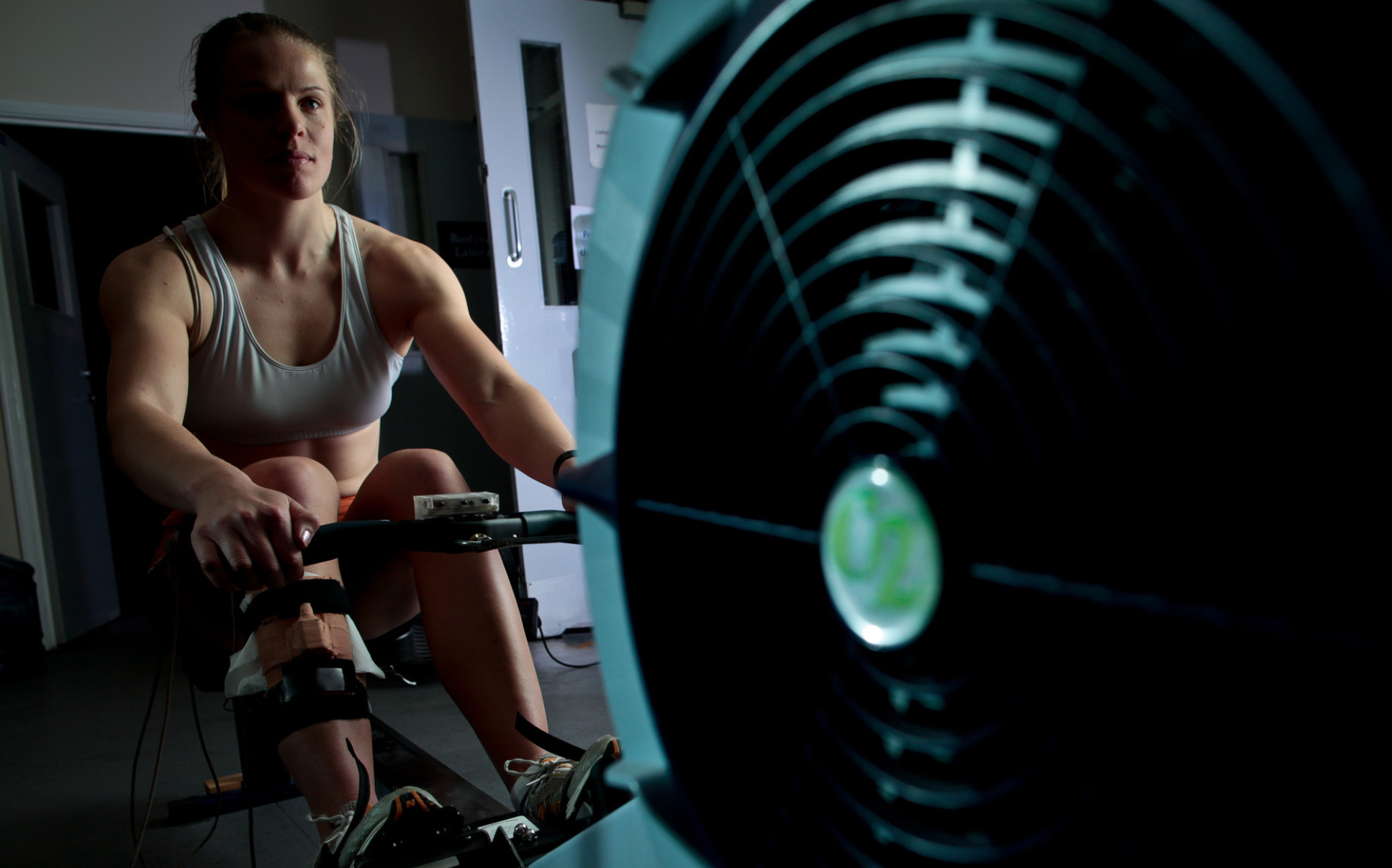Human Performance Group

Contact
Alison McGregor – Human Biodynamics
a.mcgregor@imperial.ac.uk
Paul Strutton – Neural control of movement
p.strutton@imperial.ac.uk
What we do
Human movement combines a complex and intricate series of systems which comprise the central nervous, skeletal and muscular systems of the body. There are complex interactions between the neuromuscular and musculoskeletal systems, which, in turn, are influenced by a host of other factors, e.g. anatomical structure, physiology, exercise and pain. Frequently the terms normal, abnormal and dysfunctional are used in the description of performance, but our knowledge of what constitutes normal is poorly understood. Moreover, it is not known which activities are healthy for our neuromuscular and musculoskeletal systems and which are detrimental. As a result, the long-term impact of our behaviours and lifestyles on these systems is unknown. What we do know is that function can occur at many levels including “healthy normal” everyday function, healthy extreme function (e.g. athletes, dancers etc.), “healthy” low activity/ functional normal subjects, and unhealthy which can present as subjects with either acute or chronic pain each associated with varying levels of disability. This group currently research different aspects of human function at several performance levels. This research investigates function from the perspective of the mechanics of movement, the role of muscular strength and movement control by the central nervous system.
Why it is important
By understanding how a system works and how it can go wrong we can design innovate solutions and treatment approaches to address this. Also, if we can unravel why a body system eg the hip joint becomes arthritic and what signs it shows early on, we can find novel approaches to diagnose the problem earlier and ultimately find measures to prevent it occurring or progressing.
How it can benefit patients
Low back pain and musculoskeletal problems, especially arthritis, are some of the biggest contributors to years lost with disability and low quality of life, with significant financial burdens for the person and society. By addressing management of such conditions we will enhance the population’s quality of life and reduce disability.
Summary of current research
Our research aims at addressing many areas of human function, how it is impacted by trauma, disease or injury and how different rehabilitation approaches can be used to enhance or recover lost function. Our research includes a range of digital care approaches including the use of wearable technologies to enhance care and our understanding of human function and behaviour. This is supported through our human motion and neurophysiology labs. We have several active research projects covering a range of topics within our group including:-
- Implications of amputation from trauma to long term health including bone health and low back pain
- Smart socket sensors and socket fit for amputees
- Mechanical and functional benefits of through knee amputation over above knee amputation
- Assessment of neuromuscular function in healthy subjects and in those with reduced function, e.g. those with low back pain and spinal cord injury
- Mechanisms of pain reduction (e.g. using virtual reality or non-invasive brain stimulation) in models of persistent pain
- Elite sport
- Biomechanics of the upper limb in rowing and implications for performance
- Wearable sensors to offer biofeedback during sports performance
- Low back pain
- Digital self-management tools for low back pain
- Management of low back pain in Saudi Arabia
Osteoarthritis
- Physiological and biomechanical markers of osteoarthritis
- Rehabilitation interventions in the management of joint replacement
Wearables and digital health
- Patterns of physical activity and cancer risk
- The use of soft robotics to reassure patient during cancer treatments
- Stretchable sensors to measure rehabilitation compliance and performance
- COVID recovery app
Surgical recovery (pre and post-operative rehabilitation)
- Understanding chest expansion and lung function after surgery for oesophageal cancer: Can we enhance post-op recovery
Additional information
Funders
Related Centres and industry
Related Centres
- Centre for Blast Injury Studies | Research groups | Imperial College London
- Musculoskeletal Medical Engineering Centre | Research groups | Imperial College London
- Rehabilitation Technologies | Research groups | Imperial College London
- TraCentre for Performance Scienceuma Bioengineering | Research groups | Imperial College London
- UK Dementia Research Institute at Imperial | Research groups | Imperial College London
Industry
For patients
Collaborators
Internal
- Dr Richard Abel
- Dr Caroline Alexander
- Professor Stephen Brett
- Professor Adolfo Bronstein
- Professor Anthony M J Bull
- Professor Alun H Davies
- Professor Dario Farina
- Professor George Hanna
- Dr Angela Kedgley
- Professor Pernilla Lagergren
- Professor Azeem Majeed
- Dr Sheraz Markar
- Dr Emily Mayhew
- Professor Leftkos Middleton
- Dr Nicolas Newell
- Professor Nick Oliver
- Dr Isabel Garcia Perez
- Dr Andrew Phillips
- Professor Andrew Rice
- Dr Justin Roe
- Dr Sina Sareh
- Dr Barry Seemungal
- Professor David Sharp
- Dr Ravi Vaidyanathan
- Professor Mary Wells
- Dr Matthew Williams
External
PhD students
- Mai Aldera
- Yewande Adesida
- Brieuc Panhelleux
- Gemma Clunnie
- David Hohenschurz-Schmidt
- Lewis Formstone
- Josh Kauffman
- Peter Le Feuvre
- Shloak Mehta
- Filip Paszkiewicz
- Analou Sugar
- Karina Tukanova
- Shruti Turner
- Caryn Urbanczyk
- James Wang
- Tianyu Zhou
- Dr Pawandeep Sarai (Strutton)
- Dan Terracina Barcas (Strutton)
Clinical trials
Our researchers
Professor Alison McGregor
/prod01/channel_2/media/migration/faculty-of-medicine/professor-alison-mcgregor_1611915164958_x4.jpg)
Professor Alison McGregor
Principal investigator
Dr Paul Strutton
/prod01/channel_2/media/migration/faculty-of-medicine/dr-paul-strutton_1611915263893_x4.jpg)
Dr Paul Strutton
Reader in Human Neurophysiology
Dr Matt Hopkins
/prod01/channel_2/media/migration/faculty-of-medicine/holding-png-tojpeg-1564655919889-x2_1611916052704_x4.jpg)
Dr Matt Hopkins
Research Associate
Dr David Salman
/prod01/channel_2/media/migration/faculty-of-medicine/portraitjpgjsessionidn9qggt0dn4lzlrmxnqj8xgmbjhpbcn1z8X2fqysmmp1pd4qbtxw1-305922556_1611920681718_x4.jpg)
Dr David Salman
Honorary Clinical Research Fellow
Dr Chris Mullington
/prod01/channel_2/media/migration/faculty-of-medicine/portrait6_1611920795512_x4.jpg)
Dr Chris Mullington
Honorary Clinical Research Fellow
Dr Enrica Papi
/prod01/channel_2/media/migration/faculty-of-medicine/portrait7_1611920872259_x4.jpg)
Dr Enrica Papi
Honorary Research Associate


